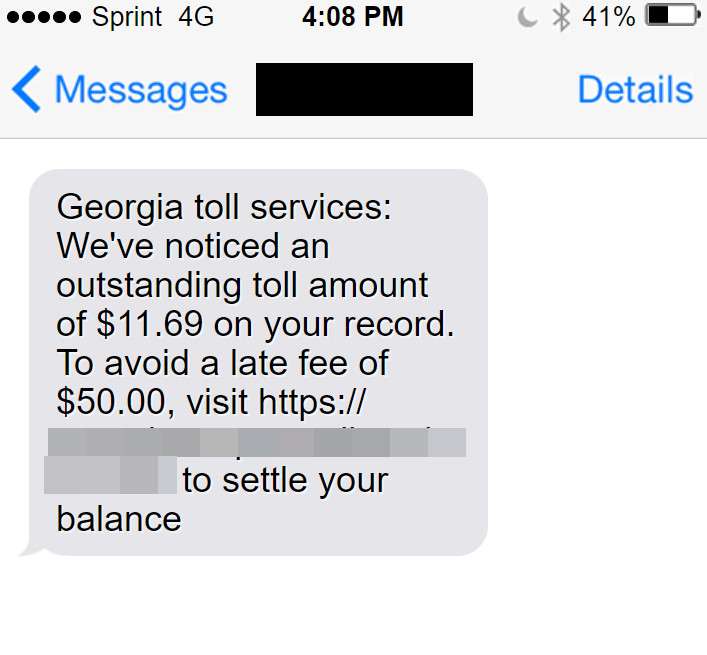Drivers in Georgia are being bombarded by a new text message scam impersonating the Georgia State Tollway Authority. These fraudulent texts claim you owe money for unpaid tolls and threaten steep late fees if you don’t pay immediately. But it’s all a ruse to steal your money and personal information.
This guide will uncover the dirty tricks behind this Georgia toll services scam, provide tips to recognize scammer’s messages, and explain how to protect yourself from being bamboozled. Don’t let these digital toll thieves take you for a ride – get savvy to their scheming ways. Read on to navigate around this latest toll road scam sweeping the Peach State.

Scam Overview
This rampant toll scam sweeping Georgia works by sending unsolicited text messages to random phone numbers across the state. The texts impersonate the Georgia State Tollway Authority, your tireless friend on daily commutes, hoping to exploit the trust in and familiarity of this essential agency among local residents.
The scam messages claim that the recipient has an outstanding unpaid toll bill, typically for an amount like $11.69 or $12.87. These oddly specific figures are selected to add an air of legitimacy to the supposed debt. The texts then go on to threaten steep penalties if immediate action is not taken.
A link is included to a fraudulent website purporting to be an online portal for the Georgia toll authority. However, visitors to the site are met only with further deceit in the form of convincing interfaces crafted just to enable theft of your personal and financial data.
These texts are engineered to scare recipients into urgently paying the fake toll bill to avoid supplementary late fees. But rest assured, both the initial toll amount stated and any additional penalties listed are utterly false, merely figments of the scammers’ imaginations.
The phone numbers sending the text vary, often using local area codes and prefixes to increase trust. But the messages are not in fact coming from any authorized system associated with Georgia’s legitimate toll agencies. They are broadcast en masse from fraudsters hiding behind a veil of technological tricks to mask their true origin.
If users click the link, they are led to elaborately designed imposter websites claiming to be the Georgia toll authority’s payment portal. However, not a single component of these fraudulent sites is legitimate. The interfaces, invoices, payment forms, and account management pages are entirely fabricated with the sole intent of harvesting as much user data as possible.
Once on the websites, users are asked to input an array of sensitive personal information such as full name, home address, phone number, date of birth, and crucially – credit card details. Under the guise of routine validation, identity verification, or payment collection, unsuspecting individuals hand over the keys to their identity, finances, and more.
These details are stolen without a second thought by the scammers who now have free rein to engage in identity theft, credit card fraud, or even resell your information on the dark web to other criminals. Not a single penny goes toward any real toll payments. The scammers walk away with both your data and dollars.
Reports indicate thousands of Georgians have already fallen prey, with many losing significant funds by paying the fake toll bills and penalties before eventually realizing it was all an elaborate ruse. For each person who uncovered the scam at some point, there are likely many more still unaware of the fraud if they have not yet spotted unauthorized charges or suspicious activity on their accounts.
Others have had identities compromised, credit damaged, and accounts emptied before they ever learn the root of the issue – those cunning texts and websites disguised as Georgia’s toll managers. Some victims even turned over their Social Security numbers when asked by the fake websites during their well-crafted data harvesting processes.
The scale of the financial and personal losses is massive, but so too is the violation of our sacred trust in institutions that serve the public good. The organizations who maintain our roadways and transportation systems do not take their responsibilities lightly. But scammers seek to tarnish their reputations and undermine the community’s faith in them for their own selfish gain.
How the Georgia Toll Services Scam Works
From the initial text message to the fraudulent website, here’s an in-depth look at how this scam unfolds:
1. The Text
The scam starts with an unsolicited text sent to random Georgia numbers. The message claims to be from “Georgia Toll Services” and states the recipient has an unpaid toll bill, often for an odd-specific amount like $11.69.
The text threatens a lofty “late fee” if the toll is not paid immediately on the linked website. For example:
“Georgia Toll Services: We’ve noticed an outstanding toll amount of $11.69 on your record. To avoid a late fee of $50.00, visit https://georgiasunpasstollservices.com to settle your balance.”
Several manipulation techniques give the message an air of legitimacy:
- Official sounding agency name
- Specific unpaid amount
- Threat of steep late fees
- Link to pay the “bill”
This frightens recipients into quickly paying to avoid fines. The peculiar amount, threat of penalties, and link seem credible on the surface.
2. Visiting the Fake Website
Clicking the link sends users to a convincing imposter website posing as the Georgia tollway authority. The site asks users to enter personal details like full name, address, phone number, and date of birth, claiming it’s to “validate your search.”
In reality, this harvests valuable info the scammers use to steal identities and commit other frauds. The website looks legitimate and official to trick users into compliance.
3. Submitting Payment
After users submit their data, the website presents them with a fake invoice for the exact unpaid toll amount from the text. Official logos make the invoice appear valid.
Scammers also tack on a “late fee” to urgency payment. Users are prompted to enter credit card information, billing address, and CVV code to settle the “outstanding toll.”
But just like that, the scammers have your credit card details for fraudulent purchases, and both your personal and financial information to misuse at will. No money goes to paying real tolls, which users won’t realize until much later.
What to Do if You Are Scammed
If you unfortunately got hooked by this devious toll scam, take these steps immediately to mitigate damages:
- Contact your credit card provider to cancel your card and dispute the charges as fraud. Monitor statements closely.
- Place fraud alerts with credit bureaus and consider enrolling in credit monitoring to detect any misuse.
- For suspected identity theft, file an FTC complaint and report to the Georgia Attorney General.
- Change account passwords, especially if reused on the scam site. Make them long and complex.
- Contact tollway authorities through official websites or known numbers to inquire about legitimate unpaid tolls.
- Block phone numbers that sent scam texts, but keep a record of them.
- Warn family and friends about this scam to prevent more victims.
Act fast if your information was compromised, as that data in scammer hands can unleash further fraud. Learn from this experience to strengthen your scam avoidance skills for the future.
Frequently Asked Questions about the Georgia Toll Services Scam
1. What is the Georgia Toll Services scam?
The Georgia Toll Services scam involves scammers sending fake text messages claiming to be from the Georgia toll authority. The texts say you have unpaid tolls and must pay immediately to avoid penalties. If you click their link, you are taken to fraudulent websites that steal your personal and financial information. No money goes toward paying actual tolls.
2. Who are the messages from?
The texts are not from Georgia’s real toll agencies. They come from scammers spoofing local phone numbers to look authentic. “Georgia Toll Services” is a fake name used to commit this fraud.
3. What details do the scam texts include?
The scam texts mention an odd-specific unpaid toll amount, threats of high late fees, and a link to a fake website impersonating the Georgia toll authority. The texts instill urgency to pay quickly.
4. How can I recognize the Georgia Toll Services scam?
Warning signs include getting unsolicited texts about unpaid tolls, steep late fees, links to unfamiliar sites, requests for personal info, and pressure to pay immediately. The toll amount, fees, and website are all fabricated.
5. What keywords should raise red flags?
Phrases like “Georgia Toll Services,” “outstanding toll,” “late fee,” and links to random websites are red flags. Legitimate toll agencies do not contact you this way.
6. Are there sender IDs I can look out for?
The texts come from a variety of changing local phone numbers. Scammers often spoof caller IDs to look authentic. There are no specific numbers that always signal this scam.
7. How can I avoid this Georgia toll scam?
Do not click links in suspicious texts. Contact toll agencies through official channels on government websites if you have toll inquiries. Only pay tolls through your account on the official toll authority website.
8. What should I do if I get a questionable text?
If you receive a suspicious toll-related text, do not click the link or call the number. Report the scam to the Georgia Attorney General. Call toll agencies directly using official numbers to ask about unpaid tolls.
9. How can I safely pay any legitimate tolls?
Log into your account on your state’s official toll authority website. Use official online or phone payment options only. Never pay toll bills on third-party sites, especially ones sent unexpectedly via text.
10. What should I do if I paid a fake toll bill?
If you shared information or paid, contact your credit card company immediately to dispute the charges. Place fraud alerts with credit bureaus, monitor your statements closely, change account passwords, and contact the Georgia AG.
The Bottom Line
The Georgia toll services text scam is a dangerous fraud threatening drivers across the state. Avoid letting fabricated texts and websites manipulate you into giving up personal or financial information.
Use tips in this guide to recognize scam messages, websites, and payment requests. Only use official toll authority channels to make balance inquiries and payments. Verify links and numbers before providing any sensitive data.
Together we can slam the brakes on these toll road thieves. Share this scam awareness and equip all Georgia drivers to steer clear of frauds lurking on our daily commutes. Stay two steps ahead of scammers who seek to exploit toll systems to rob users. Don’t allow them to take you for a ride.



